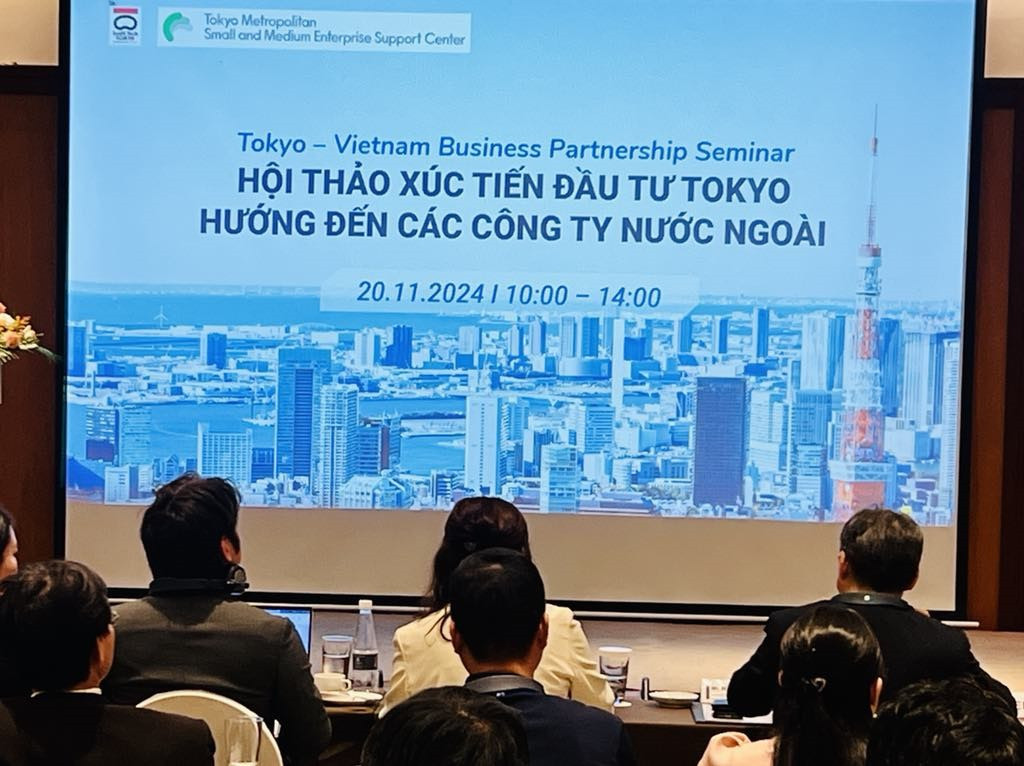
Information to invite Vietnamese to set up businesses in Tokyo was released at the Tokyo-Vietnam Business Partnership Seminar held by Tokyo Small and Medium Enterprise Support Center on November 20, 2024 in Hanoi
According to Yuji Ikeda from Deloitte Tohmatsu Venture Support, 76 percent of foreign businesses set up their head offices in Tokyo, a figure reflecting the attractiveness of the city as a Japanese investment center for foreign investors.
Tokyo ranks 10th in the list of the global startup ecosystem. In 2022, the government of Japan announced a plan to develop startup projects for five years, with an investment package worth 10 trillion yen which aims at creating 100 unicorns and 100,000 startups.
The attractiveness of Tokyo lies in its high level of income and clients for products and services, which means a large market; developed infrastructure (transport, energy, information and communications); clients’ sensitivity to added value of products and services; the location of many multinationals; and good living environment.
Meanwhile, the factors that may hinder business expansion in Tokyo, as found by the Japanese Ministry of Economy, Trade and Industry, include high business costs (labor cost, tax, office leasing).
However, Marisa Yamamoto from Deloitte Tohmatsu Venture Support stressed that the Tokyo metropolitan authorities and other agencies have been deploying measures to support businesses that want to join the market, including financial support to newly established businesses.
She named a series of programs with support totaling up to tens of million of yen.
Meanwhile, the Business Development Center TOKYO provides convenient and valuable information to support business connections. The Tokyo One-Stop Business Establishment Center (TOSBEC) supports procedures related to business registration and tax documents to those who cannot speak Japanese, and the Tokyo Innovation Base (TIB) can offer co-working space for free to newly set up businesses to organize events.
Charter capital, cultural characteristics
After eight years of operation in the Japanese market, NTQ Japan decided to relocate its office from Yokohama to Tokyo in April 2023.
While many businesspeople don’t want to set up offices in Tokyo because they fear high operation costs, Mizuno Gia Cat of NTQ Solution said that the requirements for someone to come to Japan and set up a business with two members at minimum are not difficult to meet. He just needs to have 5 million yen ($30,000-35,000) for the charter capital of the business. The initial tax is less than $5,000. And the rent for a 20-30 sqm office in the suburbs is relatively low.
Regarding wages for Japanese workers, the average pay for new graduates is $2,000-2,500 a month and startups can hire accountants at just $200-300.
The costs are not high for businesses. And if the businesses have clear business plans and can prove their capability, they can receive other kinds of support. Anyone establishing a legal entity has the right to receive support from the government.
However, Cat noted that Vietnamese businesses have to compete with many rivals in the Japanese market, including ones from China and India, so they have to offer good pay to retain workers.
Vietnamese investors have also been advised to carefully learn about the market and typical cultural characteristics, conduct fact-finding trips to Japan to establish networks for the future, and prepare workers fluent in Japanese skills. These factors will help increase the success probability rate in Japan.
It is necessary to establish good relations with the Vietnamese community in Japan, with 600,000 people, and with local partners and agencies.
Since real estate costs in Tokyo are relatively high, Vietnamese businesses need to prepare for activities related to workers’ lives. It was once easy to rent premises for entertainment clubs when NTQ Japan was in Yokohama, but it is now more difficult to find premises in the capital city.
Vietnamese businesses should understand Japanese business culture to optimize their business opportunities. In general, Japanese businesses need a lot of time to make decisions as any plan needs to go through many different levels of officers.
Binh Minh